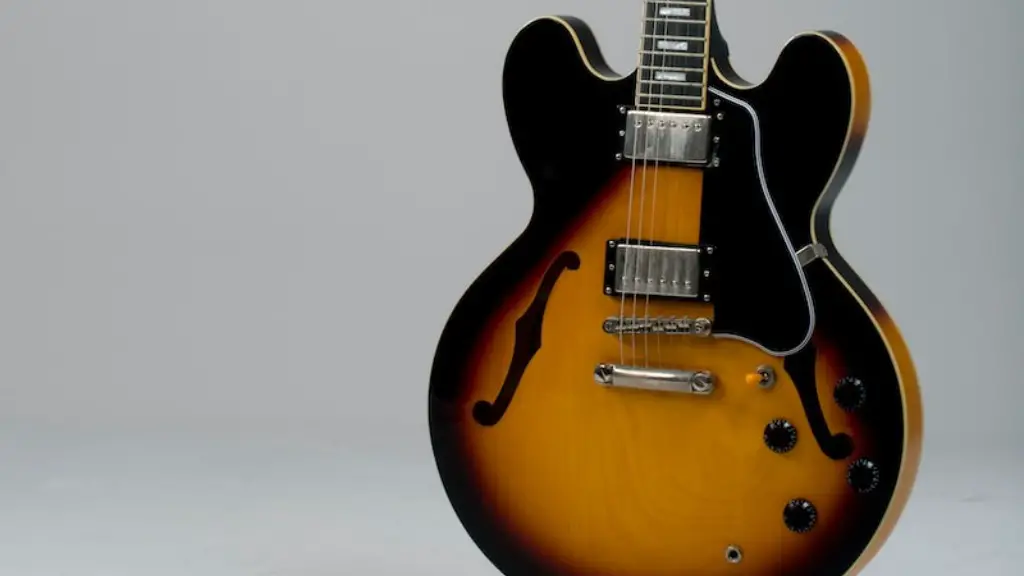Learning an electric guitar is a much different experience than learning an acoustic guitar. While both instruments share many similarities, such as the same notes and the same chords, the techniques used to play them are quite different.
Electric guitars are typically used in rock, blues and jazz genres, while acoustic guitars are more popularly used in folk and classical music. Electric guitars require the use of an amplifier to produce sound, whereas acoustic guitars rely solely on their strings. This means that electric guitarists must learn to adjust the volume and tone with their hands as they play, while acoustic guitarists must learn to strum with greater force or use a pick to increase their sound volume.
Electric guitarists also need to be aware of how their instrument interacts with pedals and other effects. Acoustic players have no need for this knowledge. Despite these differences, both styles of playing can be mastered if one puts in enough time and effort.
Disadvantages of Learning Electric Guitar
Learning electric guitar can be more challenging than learning acoustic guitar due to the need for additional equipment. An electric guitar requires an amplifier, cabling, and a power source in order to produce sound. Not only that, but electric guitars also require more maintenance than acoustic guitars. Strings get worn down quicker and the instrument needs to be tuned more often. Additionally, electric guitars need to be regularly cleaned in order to prevent rusting or warping of the metal components.
Another disadvantage is the cost of playing. Electric guitars are generally more expensive than acoustic guitars and associated equipment such as amplifiers and cables can add up quickly. Furthermore, the cost of repairs can be much higher for an electric guitar because it contains electronic components which may need to be replaced over time. As such, learning electric guitar may not be suitable for those on a tight budget.
Finally, many people prefer the sound of an acoustic guitar for certain genres or styles of music. For example, folk and blues are often best suited for an acoustic guitar as its natural tone adds depth and texture to these styles of music that cannot be replicated with an electric instrument.
Cost Comparison of Electric and Acoustic Guitars
The cost of learning electric guitar is often compared to that of acoustic guitar. While electric guitars are typically more expensive than acoustic guitars, the cost of learning either instrument is comparable. An acoustic guitar typically costs more initially, due to the cost of purchasing an amplifier and cables. However, electric guitars have a larger range of sounds and can be used to play in a variety of genres. Electric guitars also require more maintenance, as the strings must be regularly changed and amps need to be recharged or replaced over time.
The cost of lessons for both instruments is similar. Many music schools offer classes in both electric and acoustic guitar, so it’s easy to find a teacher who can teach the basics for either instrument. Private lessons are often slightly cheaper for acoustic guitar, but students can save money by taking lessons online or in group sessions for both instruments. Overall, learning either instrument requires an investment in time, money and dedication. However, with practice and patience, anyone who puts in the effort can become proficient on either electric or acoustic guitar.
Electric vs Acoustic Guitars
Electric and acoustic guitars offer two distinct sounds. When learning guitar, it is important to understand the differences between them. Acoustic guitars have a resonant, warm sound that comes from the hollow body of the guitar, while electric guitars use pickups to amplify their sound. Electric guitars are often used in genres such as rock and metal, where they provide a high-energy sound with plenty of volume and distortion. Acoustic guitars are typically used in softer, more intimate genres like folk or country music. Learning one type of guitar will not necessarily give the same results as learning another.
Electric guitars require additional equipment such as an amplifier and cables, while acoustic guitars only need strings and tuning machines. Electric guitars also require more maintenance such as regularly changing strings and cleaning pickups to ensure quality sound. On the other hand, acoustic guitars are generally more durable and require less maintenance.
Ultimately, it is up to you which type of guitar you choose to learn; both offer unique sounds that can be explored for years to come. Understanding how each instrument works will allow you to make an informed decision about which one is right for you!
Skill Requirements for Playing an Electric or Acoustic Guitar
Playing guitar is a great way to express yourself musically. Many people wonder if learning an electric guitar is the same as learning an acoustic guitar. The answer is no, they require different skills. Electric guitars require knowledge of amplifier settings, distortion and effects pedals, and different types of pickups. Acoustic guitars require knowledge of string gauge, tonewoods, and the ability to play without amplification. Both styles of guitars require fingerpicking and strumming techniques, fretting chords properly, and learning scales and arpeggios. Additionally, electric guitarists need to be familiar with music theory as it applies to playing lead solos. For both electric and acoustic guitarists, understanding rhythm and timing is essential to playing in time with other musicians. Ultimately, the skill requirements for playing an electric or acoustic guitar are slightly different but both styles can be mastered with practice and dedication.
Maintenance of an Electric or an Acoustic Guitar
Maintaining a guitar, either electric or acoustic, is essential for sound quality and longevity. For both types of guitars, regular cleaning and string changing are important. Additionally, acoustic guitars need to be tuned regularly. Electric guitars should be kept away from extreme temperatures and humidity to prevent damage to the electronics and body.
When it comes to learning electric guitar versus acoustic guitar, they both require different approaches. Acoustic guitar requires more finger strength and playing with a pick is optional. Electric guitar requires a pick, as well as knowledge of amps and effects pedals. Both types of guitars require practice and dedication but with the right attitude and commitment, anyone can learn either type of instrument.
Popularity of Different Types of Guitars
Guitars are one of the most popular instruments in the world. There are several different types of guitars, each with its own distinct sound and style. Acoustic guitars use strings and a hollow body to create a warm, traditional sound. Electric guitars also use strings but have pickups that allow them to be plugged into an amplifier, creating a loud and powerful sound.
Both acoustic and electric guitars are popular among players of all levels, from beginner to professional. Acoustic guitars are typically easier to learn for beginners because they require less setup and equipment. Electric guitars tend to take more practice and skill but can provide a more dynamic range of sounds. Learning electric guitar is not necessarily the same as learning acoustic guitar. Both instruments require dedication and practice in order to master the techniques needed to play them properly.
No matter which type of guitar you choose, it is important to research what kind best suits your playing style and skill level. With so many different types available, there is sure to be one that fits your needs perfectly!
Closing Words
Learning electric guitar and acoustic guitar are two distinctively different experiences. While each type of guitar has its own advantages, they also have their own challenges. Electric guitars require the use of equipment such as amplifiers and effects pedals which can be daunting for a beginner. Acoustic guitars are simpler to learn but require more practice and dedication to master the instrument. Overall, both styles of music can be rewarding for any aspiring musician. No matter which type of guitar you choose, perseverance and practice will lead to success in playing the instrument.




